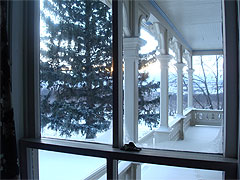Accompaniment
I’ve been sleeping on the loveseat in my mother’s study. You would not think it comfortable, but curled into a fetal position within its square arms and rounded pillows I manage to find restorative sleep. Not that it is uninterrupted sleep, but at least there is plenty of it. I cannot help but compare the rhythm of these nights to those first ones just after bringing my babies home from the hospital. There is something satisfying about the tender caretaking that is administered in the quietest part of the night.

We are spun in the cocoon of Hospice. A cold and white winter waits outside. We are warm and attentive within the walls of this old, noisy house. When my mother sleeps, I hear the sounds of ticking clocks and shutters knocking in the wind. The furnace kicks in and rocks the whole house, just like it always has. I like all these odd, familiar noises, even in the night. They keep me company when my mother is asleep.
A social worker called and asked to come see my mother, who is not that interested in visitors, but we realized this is all part of the Hospice checklist. As it should be; aside from the furniture, the physical care and the advice about administering pain-relief, it is entirely appropriate to assess the dying patient’s need for psychological and emotional support. It’s not like everyone knows how to die.
She arrived with a notepad, an over-compassionate expression and a gift, a hand-knit shawl. She asked all the questions my poor mother has answered already a half-dozen times in the last week as each Hospice staffer has come to meet her and familiarize themselves with her case. And then more questions: Are you ready to die? How do you feel about dying? My mother has done much thinking about this topic, evident from that natural language she used to convey her state of mind. She graciously indulged the long string of questions, though it taxed her to talk for so long.
And then finally, she’d had enough.
“You know,” she said. “I remember something Elisabeth Kübler-Ross once told me…” (I wish I could repeat the rest of what my mother said, I’m sure it was wise. But I didn’t hear it because of the extra-loud Ch-Ching that went off in the back of my brain.)
A personal affiliation with the Guru of death and dying obviously trumps an inquisitive social worker. My mother has always known how to gently move things along. Her pointed comment led to a bit of final small talk, appreciative goodbyes and call if you change your mind about the Chaplain. Yes, of course, and thanks for the shawl.
(Kübler-Ross, it turns out, was a commencement speaker at a college where my mother worked. Mom really did have occasion to speak with her, at length. Who knew?)
After the social worker left, my mother eyed the shawl. “Make sure it ends up in one of the boxes upstairs, for the yard sale.” For years she’s been putting stuff aside for this heralded event. Even in the last days of her life, she is still anticipating the moment when her home will be free of the clutter she’s collected. I told her that in heaven there are effortless yard sales, managed by angels, where everything sells.


January 30th, 2010 at 7:53 pm
I am so glad you are there with your mother. What a gift it is for her, and for you, too. So many people in our lives leave or die without ever being able to have these conversations about what it means, or say goodbye at all. I love reading about your mother’s spunk and humour and graciousness, even now, in her final hour. What riches you have inherited…
January 30th, 2010 at 8:56 pm
I’m sending love. [hug] [hug] [hug] [kiss]
January 30th, 2010 at 9:44 pm
One thing I learned very quickly when Judy’s mother passed; hospice is not only there to help her cope with her dying. The more important aspect of hospice is to help the remaining family members with her passing. We had hospice for about 3-4 months, and only at the end did we realized all of the wonderful ways they ushered us along and prepared us for the inevitable journey. Keep your wonderful mind open. Please give your mom a kiss for me. My prayers are with you all. Love you, Harold
January 30th, 2010 at 10:23 pm
Wishing you love and courage and peace and fortitude. Humble, beautiful post.
January 31st, 2010 at 3:00 am
Sending much love to you both. You are an inspiration to those of us who will someday inevitably follow in your footsteps, along a similar path.
January 31st, 2010 at 6:15 am
Sending thoughts and prayers of love, peace, and comfort to all.
January 31st, 2010 at 9:57 am
xxx
January 31st, 2010 at 6:50 pm
Thank you for sharing your journey – I’m not sure why I find your posts so comforting, but I do. Perhaps it’s the time you spend sorting out your feelings that enables me to do the same a little bit easier. Big warm virtual hugs are being sent your way. Love, Siri
February 1st, 2010 at 2:07 am
And we should all hope to be able to prepare to exit with such grace.
Peace to you, Dee
February 4th, 2010 at 9:33 pm
I wish I could do something for you. You are doing good for her. (And I love the bit about instantly sending the shawl into the tag sale box.)